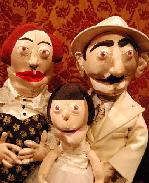SITE GUIDE
SEARCH
REVIEWS
REVIEW ARCHIVES
ADVERTISING AT CURTAINUP
FEATURES
NEWS
Etcetera and
Short Term Listings
LISTINGS
Broadway
Off-Broadway
NYC Restaurants
BOOKS and CDs
OTHER PLACES
Berkshires
London
California
New Jersey
DC
Philadelphia
Elsewhere
QUOTES
TKTS
PLAYWRIGHTS' ALBUMS
LETTERS TO EDITOR
FILM
LINKS
MISCELLANEOUS
Free Updates
Masthead
Writing for Us
A CurtainUp Review
Fabrik
|
My name is Moritz Moses Rabinowitz. I am a Jew. And I am Norwegian.
.—- Moritz Rabinowitz
|

The Rabinowitz Family: Johanna (wife), Edith (daughter) and Moritz.
(Photo: Nordland Visual Theatre)
|
Wakka Wakka Production's Fabrik uses hand-and-rod puppets (created by Kirjan Waage), masks, mini-sets and props, music composed by the ensemble, and a score by Lars Peter Hagen to tell the story of Rabinowitz, a successful Polish immigrant who "built a factory from a button" only to see his life destroyed during the Holocaust.
With Danny Goldstein (Walmartopia) as directing consultant, three puppeteers — David Arkema, Kirjan Waage and Gwendolyn Warnock— manipulate and give voice to the puppets. Dressed in black suits and black fedoras, they portray over two dozen characters including Rabinowitz; his wife, Johanna; their daughter, Edith; his employee, Mr. Askeland; Hitler; and Winston Churchill.
In the hands of this capable trio, these puppets become intensely human and their fate unbearably painful. Rabinowitz is a likeable and self-assured businessman who is guided through life by a long list of ethical rules that sometimes seem almost Talmudic. He is a loving, if not completely faithful husband and a devoted father. He is also a kind-hearted boss and a principled businessman, proud of the quality of the suits produced by his factory. At times his inflated idea of who he is can be a bit ridiculous, especially considering his diminutive size as a puppet. But like Sesame Street's Bert and Ernie, in Yiddish he would be called a mensch.
Inspired by Nordic and Yiddish folktales and informed by research of the time period, as well as the writings of Rabinowitz, his family, workers and countrymen, Fabrik blends European cabaret with traditional puppetry and reportage. Puppets fly through the air, dance, drive in cars, ride in boats, live, love and die.
Side by side with realism, there is a surreal quality to the play. Sometimes the puppeteers wear masks. Occasionally the puppets themselves wear masks. Thus fantasy is layered on fantasy. Dramatic sound and lighting created by the ensemble emphasize the demonic rise of Hitler and the spiritual nature of Rabinowitz's struggle.
The ever-present element of fantasy heightens its sorrowful reality. Fabrik takes the audience out of flesh-and-blood existence to a world beyond time and place . . . a world of powerful emotion and memory. . . a world where tragedy and comedy collide. . . a world that unmistakably and unrelentingly resembles life.
|
FABRIK: THE LEGEND OF M. RABINOWITZ By Wakka Wakka Productions Directing Consultant: Danny Goldstein Puppeteers: David Arkema, Kirjan Waage, Gwendolyn Warnock Original Score: Lars Peter Hagen Running Time: 55 minutes, no intermission Urban Stages Theatre 259 West 30th Street between 7th and 8th avenues From 1/17/08; opening 1/23/08, closing 1/17/08 Tuesday — Sunday at 8pm Tickets: (212) 352-3101 Reviewed by Paulanne Simmons Jan. 25, 2008 |



